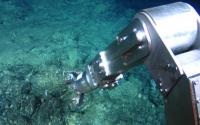Revision of Deep seabed mining has potential to cause significant environmental damage and should be regulated from Sun, 03/19/2023 - 13:46
Deep seabed mining could have serious impacts on the ocean environment and the future livelihoods and well being of coastal communities. An international, multi-sector approach to management and protection, similar to that under development by the International Seabed Authority under UNCLOS, is needed, if we are to ensure the health and sustainable use of our oceans.
Quicktabs: Arguments

On Wednesday, the Center for Biological Diversity announced it has settled a federal court lawsuit against the National Oceanic and Atmospheric Administration and its parent agency, the U.S. Department of Commerce, in a move that will compel federal officials to conduct in-depth assessments of the risks to wildlife and underwater ecosystems before issuing permits for the exploration of the ocean floor for rare-earth metals and minerals.
[ More ]
The emerging deep-seabed mining industry is making some environmentalists nervous as it could irreperably damage the fragile and undistrubed ecosystem on the abyssal plains.
[ More ]
A new study finds that the Clarion-Clipperton Zone, the site of much interest for mining, "harbors one of the most diverse communities of megafauna to be recorded at abyssal depths in the deep sea" raising questions about the environmental impact of deep seabed mining.
[ More ]
Pew Environment advocates for a precautionary approach to the emerging deep seabed mining industry, arguing that "[l]arge, ecologically important areas of the seabed should be closed to mineral extraction, and precautionary standards must be adopted by the ISA to minimize environmental damage where mining does occur."
[ More ]
The author surveys the emerging deep sea mining industry and argues that now is the time to engage and regulate the practice to ensure "the same industrial paradigm that destroyed much of the terrestrial ecosystems of our home planet to do the same in the deep sea."
[ More ]
With land-based mineral sources in decline, the move to mine seabeds is pushing scientists, regulators, and mining companies to collaborate on frameworks and strategies for mining the seabed responsibly.
[ More ]
The era of deep seabed mining appears to be dawning, fueled by technological advances in robotics and dwindling land-based deposits. Rising demand for copper, cobalt, gold and the rare earth elements vital in manufacturing smartphones and other high-tech products is causing a prospecting rush to the dark seafloor deep beneath the waves.
[ More ]
A group of researchers have called on the International Seabed Authority—which awards mining contracts in international waters—to designate areas as protected habitat in order to counterbalance the negative effects mining operations could have on ocean life.
[ More ]
Mining in the deep sea for minerals is uncharted territory, but one company is well on its way to making it a reality. Now, the company is trying to convince skeptical audiences it's a good idea.
[ More ]
Nonprofit conservation organisation the Center for Biological Diversity has filed a lawsuit against the US Government for permitting controversial large-scale deepsea mining in the Clarion-Clipperton Zone.
[ More ]